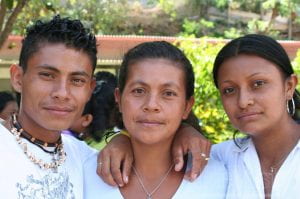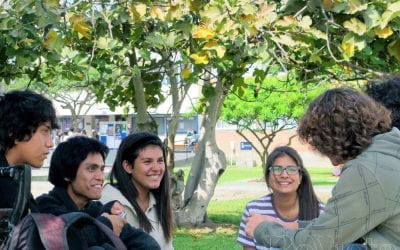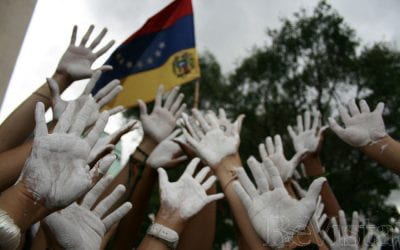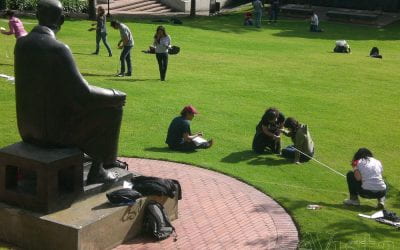Making a Difference: A Problem With the UN Millennium Goals
A Sixth Grade Diploma Is No Longer Enough
Every Saturday for two years, Estevana Sánchez walked through the jungle for miles, in the dark, crossing a river in the rainy season, to finish high school. Her five teenage children did the same. At the end of the trail, they took a long bus ride to the town of San Juan del Sur, Nicaragua, in time for the 7:30 AM start of classes. Over the past ten years, 419 students, including six Sanchezes, graduated from the Free High School for Adults.
On graduating, Estevana worked for the Ministry of Education in the adult literacy program. San Juan was declared “Free of Illiteracy” in 2008. Now Estevana works in the battered women’s shelter, a well-educated presence in the lives of troubled girls.
The vice-minister of Education says the FHS is “a model” for the country: We unleash creative energies and abilities now wasted because weekday high schools exclude so many—everyone over 18, pregnant girls, women with children, and many workers.
We teach these talented people, hungry for education, all the government-required subjects, plus computer skills, critical thinking, women’s rights, family planning, self-esteem. Our diploma opens the door to economic opportunity, teaches the values of community outreach, protects women from intra-familial violence, and helps produce the valuable workers, active citizens, and socially-minded leaders that this small country desperately needs.
Our graduates are grateful. A 34-year-old welder, Luis Sevilla, says his education helped him speak Spanish better and write better job proposals. The highest-scoring student in our Tourism program, Belkys Guillen, 27, says the school’s tradition of activism encouraged her to organize a women’s cooperative to sell high-end fruit jams. Almost 90%of our graduates work; some achieve higher ed. One alumna, a university graduate, returned to teach in the Saturday School.
We offer classes in 10 villages to 150 students, many of them subsistence farmers. Our Technical High School had a record 267 students this year, up from 110 last year. Loyal teachers and rent-free school buildings mean that a mere $98 gives a student a year’s education. Harvard Public Health student Deepa Panchang introduced us to Engineers without Borders, Boston to help with getting our own building.)
Unfortunately, the Ministry that loves us has no money for us—no texts, no salaries. Like other developing nations, Nicaragua is struggling to fulfill the basic U.N. Millennium Goal: a mere sixth-grade diploma. But, as Luis, the welder says, “You can’t get along without a high-school degree here any more.”
In the developing world, secondary education is crucial, especially for women (74 % of this year’s students are women.) The world cannot afford to educate just children, and only up to sixth grade. We can’t afford to waste the abilities of people over 18 and of women with children, and still have the educated populace needed for democracy, for productivity, for personal fulfillment in the 21st century.
Lacking government support, and to continue charging students nothing, the FHS must rely on private donations. But little corporate or foundation funding goes toward secondary education abroad. The Millennium program, a crash course toward raising capabilities around the globe, falls distressingly short in this respect. I feel the tension personally because in 2002 I co-founded the FHS with my wonderful Nicaraguan colleague, Dr. Rosa Elena Bello. I used my Harvard writing skills to write the first appeals. Together, we fund-raise to keep it going. Our students’ hopes and successes are what keep us going.
Fall 2012, Volume XII, Number 1
Margaret Morganroth Gullette, (B.A. 1962, Ph.D. 1975, Radcliffe Institute 1987) visits San Juan del Sur annually to monitor the FHS. A resident scholar at the Women’s Studies Research Center, Brandeis University, she is the author of the prize-winning Agewise: Fighting the New Ageism in America. Contact mgullette@msn.com; see
http://sanjuandelsursistercityproject.wordpress.com/adult-education/
http://greatnonprofits.org/organizations/view/newton-san-juan-del-sur-sister-project-inc
Related Articles
University Lessons: Editor’s Letter
I learned about universities on the barricades. Well, not exactly. I was a philosophy student at Barnard—the women’s college at Columbia University—when the uprising began in 1968. Students, including my boyfriend and several classmates, took over buildings to protest…
The Last Word
More than twice as many Latin Americans are attending institutions of higher education than two decades ago, and the number will continue to increase as more students graduate from secondary schools. ReVista’s timely focus on higher education is thought-provoking…
First Take: Innovating Universities
The next decade of higher education in Latin America will have a very important influence in the future of Latin America itself. It is in universities that most of the public and private leadership will be educated. It is in universities that many of the ideas about how to…





